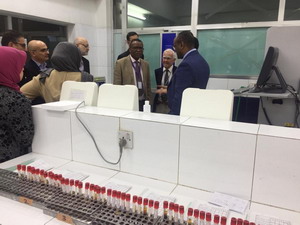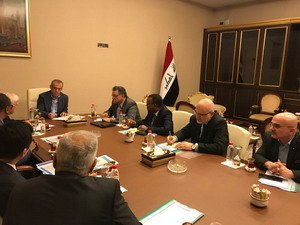
Baghdad, 3 March 2019 – With the support of WHO, the Ministry of health of Iraq has developed an action plan to improve blood safety and blood transfusion services and meet the increased demand for blood in humanitarian emergencies.
To support the ongoing efforts of the Ministry, WHO has conducted several technical support missions to the country since 2011, including in 2016. The latest took place in January 2019, which was followed by a workshop from 18 to 24 February. The missions aimed to:
- assess the situation of blood supply and clinical use;
- arrange a workshop in order to create awareness and identify key issues in reforming the national blood transfusion programme; and
- provide support to the Ministry in revising Standard Operating Procedures and technical guidelines for blood transfusion.
 WHO has also been conducting regular monitoring visits to the National Blood Transfusion Service Centre to meet blood safety professionals in Baghdad and other governorates, including the Kurdistan region, and discuss challenges encountered in the implementation of recommendations.
WHO has also been conducting regular monitoring visits to the National Blood Transfusion Service Centre to meet blood safety professionals in Baghdad and other governorates, including the Kurdistan region, and discuss challenges encountered in the implementation of recommendations.
WHO experts paid visits to hospitals and facilities involved in providing blood transfusion/safety-related services to beneficiaries, such as the Baghdad and Al-Karama hospitals. A seminar was delivered at the National Blood Transfusion Service Centre on rational use of blood and clinical governance. A workshop was also conducted on 25–26 February for experts and Iraqi officials to discuss and agree on an action plan to improve blood safety and blood transfusion services in Iraq.
 The mission concluded with a debriefing meeting with HE the Minister of Health Dr Alaa Alwan and Ministry of Health senior officials. The debriefing highlighted the need for, in the long term, proper organization and effective management of the blood system, with clearly defined responsibilities within legislation enforced by a well-organized and supported regulator/authority; in the medium term, establishment of a mechanism between the blood supply and transfusion systems and effective coordination among blood banks in the country with centralization of critical activities under the leadership of the National Blood Transfusion Service Centre; and in the short term, for the national centre to become fully functional through the provision of support to enable comprehensive oversight of the entire blood system and ensure that blood banks are legally accountable, to establish a voluntary, unpaid and regular blood donation programme, create a dedicated procurement list for the blood system, and conduct advocacy efforts to target politicians, decision-makers and the Ministry of Finance to obtain adequate financing.
The mission concluded with a debriefing meeting with HE the Minister of Health Dr Alaa Alwan and Ministry of Health senior officials. The debriefing highlighted the need for, in the long term, proper organization and effective management of the blood system, with clearly defined responsibilities within legislation enforced by a well-organized and supported regulator/authority; in the medium term, establishment of a mechanism between the blood supply and transfusion systems and effective coordination among blood banks in the country with centralization of critical activities under the leadership of the National Blood Transfusion Service Centre; and in the short term, for the national centre to become fully functional through the provision of support to enable comprehensive oversight of the entire blood system and ensure that blood banks are legally accountable, to establish a voluntary, unpaid and regular blood donation programme, create a dedicated procurement list for the blood system, and conduct advocacy efforts to target politicians, decision-makers and the Ministry of Finance to obtain adequate financing.
Dr Alwan, the Minister of Health, thanked WHO by saying: “We are very grateful for the excellent team that WHO has provided to us. They have conducted a very comprehensive assessment of where we are in terms of blood transfusion services. They have identified areas in which progress has been achieved in recent years, more importantly, where gaps exist and how we can address these gaps with the national action plan guiding action to strengthen blood transfusion services.
Related link
Factsheet on blood safety and availability
For more information, please contact:
Gheeda Mayahi
WHO Communications Officer
(+964) 7827886765
Pauline Ajello
WHO Communications Officer
(+964) 7510101460
Ajyal Sultany
WHO Communications Officer
(+964) 7740 892 878


